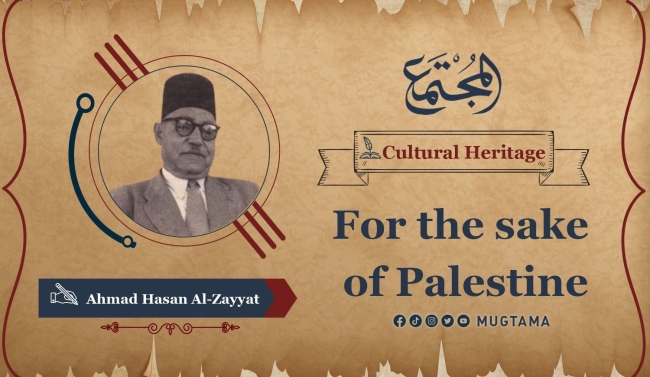For the first time in the history of Arabism and Hanafism, delegations from Eastern and Western Islamic nations gather in one place with a shared sentiment, common purpose, and general policy. This glorious and unique event resonates with the prophetic call, which arose from the thunder of revelation and the vigilance of conscience, triumphing through the strength of faith and the genius of the race, and spreading through the unity of belief, thought, passion, and pain.
The primary reason for the success of the great call can be attributed to the Arab sensibility and its readiness for spiritual and social perfection at the era of the mission, much like how the earth awakens and prepares for renewal and fruition in the spring era. The tragedy of Palestine, had it occurred at any other time, would have passed over the sentiments of the Islamic world like the raging wind over deaf rocks in the mountain or over dead roots in the forest.
Is the tragedy of Palestine not a chapter of the Andalusian tragedy? Yet, it happened within earshot of Arab and Islamic nations, yet it failed to stir a nation for its ordeal, and no consensus was reached to support it. The martyrdom of Andalus was mourned in various forms of physical and spiritual torment, while Muslims and Arabs remained oblivious to the numbness of humiliation and submission, not engaging with existence nor sensing time.
If pain alone were sufficient to awaken consciousness, unite scattered fragments, revive the dead, and foster brotherhood, then this catastrophe alone would have been the catalyst for it.
I want to say: "The Arab and Muslim support for Palestine only emerged from a new life, Palestine was a symbol of it, not its cause; and this is the actual danger that our rivals should consider and contemplate its consequences. Palestine itself could not, with its poverty and scarcity, combat the Jews, the richest of nations, nor could it have deterred the British, the strongest of countries, if not for this new life. The awakening of the Arabs is not like the awakening of other nations; they awakened their first awakening and ruled the land and the sky, left behind prophets and messengers, guided minds and desires, and only Allah knows what they will do in this second awakening."
At five o'clock in the evening last Friday, the Moroccan, Egyptian, Palestinian, Syrian, Lebanese, Yemeni, Iraqi, Iranian, Indian, Chinese, Yugoslav, and Arab diaspora parliaments gathered at the Cairo Parliamentary Conference to defend Palestine. This massive gathering, in the language of war, represented a general mobilization of Arab and Islamic forces, in defence of a significant portion of their greater homeland. A portion that is colonized by force and penetrated by cunning investors. Thus its steadfast defense of its livelihood and habitation stood firm, with no support but truth, no remedy but patience, and no path but sacrifice. Indeed, Arab unity rallied its strength after asking England for justice with no respond, pled for fairness with no answer.
Even appealed to human conscience in the League Hall, parliament chambers, and newspaper offices, finding nothing but greed echoing in ears, desires clouding hearts, and a policy built on bargaining and opposition between powers at the expense of the deceived and the weak.
The Palestinian cause has reached a decisive moment today; debates, discussions, and deceptions are of no avail. Prior to this conference, Palestine alone fought the enemy with steadfastness and perseverance, while its sisters in the East and West could only offer weapons of weakness, words and tears. When they realized that their rights were killed by mere words and that falsehoods of others were brought to life by actions, they resolved to act seriously and turned their hearts to action. Egypt, through its delegate and spokesperson Mr. Alouba Pasha, stated: "The permissible is clear, and the forbidden is clear. It is best for the British government to take action on the tragedy that has lasted so long and has seen various disasters. Either they acknowledge the rights of the oppressed, or they lean towards the falsehood of the Zionists."
Iraq, through its delegate and spokesperson, Moulood Pasha Makhlas, said: "Peace cannot be established except through a just solution to the Palestinian issue, and Iraq is ready to undertake any action to save Palestine."
Syria, represented by its delegate and spokesperson, Professor Fares Al-Khouri Bek, stated: "The establishment of a foreign state between the heart and the throat of the Arab nation is utterly rejected by the Arabs under all circumstances, and Palestine is truly the heart of Arabism because it is connected to Egypt, East Jordan, Iraq, and its other half: Syria."
India requested England, through its delegation head, Professor Abdul Rahman Al-Siddiqi, to choose between Muslims and enemies of Muslims, stating: "Eighty million Indians are ready to respond to the first call coming from Cairo."
All the nations, through their delegates, echoed such sentiments, leaving England, the ally of the Arabs and Muslims, no choice but to balance between the gold of the Zionists and the friendship of the Arabs and Muslims. Observing both in the scales to determine which carries more weight in the upcoming world war, which holds greater value in the general economic market, and which has a stronger impact on establishing peace in the near and far East.
England's life is in peace, its honor in justice, and its authority in democracy; whereas Palestine, since its creation by God, has been a scourge upon the aggressor and a calamity upon the oppressor. Both the West and the East met there once during the era of Omar and again during the era of Salah Aldin. The outcome on both occasions was the decline of the West and the rise of the East. Does Chamberlain, the messenger of peace and advocate of humanity, want to unite them again upon its land for a third time?
------------------------------------------------------------------------------







